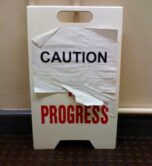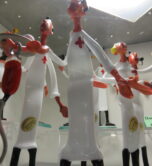It starts with the X
When I was a classroom teacher, I had a box of red pens. Marking a paper or a test, I might make an encouraging comment or point out something well written, but mostly I marked wrong answers. Mistakes. So why did I call attention to the wrong answers? With rare exceptions, the correct answers far outnumbered the errors. The red mark drew attention—mine and theirs—to what was wrong, as if that was more important.
Red marks start in our childhood and accumulate corrosively. Whereas X marks the spot of the treasure in pirate stories, it marks the spot of disappointment in our life stories.
Crime and punishment
Why do we punish mistakes? Do we hold some ridiculous hope that someday we’ll emerge into a life free from error?
Just for the sake of argument, let’s suppose that people do the best they can. Mistakes, by definition, may be due to carelessness, but never to intent. If I intentionallyscrew something up, that’s not a mistake either. A mistake is when our intent goes off the track. Most of the mistakes we make are not fatal. Forgetting to replace the toilet paper may be embarrassing, but it’s seldom life-threatening. Maybe it is just old habits.
For most of the human story we were hunters. We were also prey. Most of our decisions were of the eat or be eaten variety. But being late to pick up the dry cleaning or forgetting to get eggs at the store are about neither life nor death. So why the punishment, external or self-inflicted, when we forget to pack the right socks?
Punishing Mistakes Teaches the Wrong Lessons
Let’s learn to sidestep that bad/wrong impulse. Punishing mistakes hijacks our development.
First, we learn the wrong lessons. If mistakes bring punishment, we acquire skills to avoid getting caught, to shift the blame, make excuses, justify, argue, counterpunch. Rather than focus on learning and problem solving, we master hiding and defending. What we are left with is a wasted opportunity.
When we’re worn down by criticism, our creative intelligence disengages. If we’re afraid of making mistakes, we avoid exploration and discovery. As Thomas Edison suggested, “I have not failed. I’ve just found 10,000 ways that won’t work.” We can change our thinking to accept that each way that didn’t work can be another step toward one that will. Supervisors who punish mistakes, even subtly, get employees who are afraid to give their best.
We erode interdependence as we dish out or absorb blame. If I can’t count on you to accept my imperfection, why on earth should I drop my guard and be open and fearless with you? And if I can’t find common ground without seeing fault first, why should you? A mistake is such a great conversation starter, but only if fault is completely off the table.
Fear stunts leadership’s development. Most performance problems are due not to capacity or shoddy intent, but to cluelessness. Either too little information, the wrong information, or unforeseen consequences. We can all improve our performance by taking in feedback that suggests a better way to do it next time. When we castigate someone—including ourselves, our focus is on the past, and the past is non-negotiable.
What Can We Do?
First, lighten up.
Anger, frustration, reprimanding, all trigger what’s called amygdala hijack—a cloud of emotions that impedes our ability to listen and make sense.
Ben Zander— conductor of the Boston Children’s Philharmonic Orchestra—suggests that when we make a mistake, the appropriate response is to throw our hands in the air, raise our eyebrows, and exclaim How fascinating!!! Try it next time you blunder. Really. It will give you a great platform for a blameless conversation.
Try to shift the focus to the future. Not just future performance, but the future of the relationship. Criticism does not build trust. Finger-pointing does not model courage. A learner-friendly environment grows in the atmosphere of mutual respect, not mutual correction.
Let’s lose the X.
For you auditory learners, or if you'd like to hear a conversation with a little different slant on mistakes, just click on the link below and enjoy!






